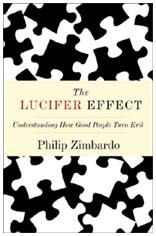 Editor's Notes Editor's Notes
When Systems Corrupt Good People
By Chuck Armsbury, Senior Editor
Lately, I've been studying why good and
normal people sometimes do bad things. Like those ordinary Columbine
high schoolers on 4/20 in 1999 who went bowling in the morning
before killing fellow students and themselves in the afternoon.
For example, the nice kid you know from your small town who joined
the Marines, and who now kicks in Iraqi doors and shoots women
and children, or the prison guards who go to church on Sunday
and kick prisoners' butts during the week.
Revelations of Abu Ghraib torture represent
very well this ages-old dilemma. "The Christian in me says
it's wrong, but the corrections officer in me says, 'I love to
make a grown man piss himself,'" said Specialist Charles
Graner as reported on BBC News in spring 2005. Employed
previously as a prison guard in the US, Graner is the Abu Ghraib
military policeman shown smiling and having fun next to a pile
of naked Iraqis in widely circulated photos.
What was it about the inner sanctum of
Abu Ghraib, Saddam Hussein's former dungeon, which brewed a nasty
concoction of power, sexual perversion and multiple counts of
torture and abuse? How did our US troops come to act like Saddam's
henchmen?
Was Graner some kind of sick sadist, a
psychopath, an undiagnosed schizoid? Do we look within the torturer's
head for answers? Or do we find those answers by a study of the
power of situations to turn nice Christians like Graner into
torturers, others into silent bystanders?
 Phil Zimbardo's book
The Lucifer Effect provides answers we're looking for.
Dr. Zimbardo is the Stanford University psychology professor
who designed and supervised the August 1971 Stanford Prison Experiment
(www.prisonexp.org).
Dividing student volunteers by a coin's flip into guards or prisoners,
Zimbardo's five-day experiment produced surprising results. Mainly,
from the start these ordinary students quickly "became the
roles" they had assumed in this psychodrama. Guards dominated,
prisoners submitted. Phil Zimbardo's book
The Lucifer Effect provides answers we're looking for.
Dr. Zimbardo is the Stanford University psychology professor
who designed and supervised the August 1971 Stanford Prison Experiment
(www.prisonexp.org).
Dividing student volunteers by a coin's flip into guards or prisoners,
Zimbardo's five-day experiment produced surprising results. Mainly,
from the start these ordinary students quickly "became the
roles" they had assumed in this psychodrama. Guards dominated,
prisoners submitted.
Those who became guards by flip of a coin
began to act like real prison guards: giving senseless orders,
punishing rule violations, acting arbitrarily and manipulative.
Likewise, students playing prisoner soon adopted strategies for
dealing with their unequal power-situation. Each student for
the experiment earned daily money; each was screened for hidden
personality quirks, and several wore long hair and described
themselves as leftist radicals.
After five days that began with a 'fake'
arrest to start the experiment, to the moment Zimbardo called
it off, each of these 18 male students 'lived the roles' they
played. Particular "guards" became abusers, rule followers
or good guys; a couple "prisoners" experienced real
emotional trauma, rebels were put in the (closet) hole, and one
had to be released before five days.
The Lucifer Effect is Zimbardo's 2007 full account of the SPE. There's
a full chapter on Abu Ghraib, sections on the 1978 Jim Jones'
Guyana mass suicides, Halloween mischief and anonymity, studies
of attitudes about ridding society of social misfits, types of
dehumanization and the evil of inaction.
To dispel utter hopelessness, Zimbardo
finishes with a chapter on "Resisting Situational Influences
And Celebrating Heroism." This is a very valuable book
for social researchers and anyone wanting answers about the dynamic
interplay of personality, systems and real situations, or more
grandly, psychology and sociology.
After all, The Lucifer Effect is
about you and me. It's about who we really are, or more so, who
we think we are? Are you a Good Samaritan, or do you walk on
by that drunk lying in the gutter? Under what circumstances would
you ever intervene to stop a crime?
Zimbardo and other 'situationists' offer
convincing evidence that changing circumstances can bring out
the angel or devil in any one person, family or nation. "We"
are always "Them" to the Other. And under the power
of a wrong situation, you or I may cast aside morality, habits
of mind, principles and beliefs and "do wrong."
Unfortunately, it seems only a few of us
frail humans become heroes who resist unlawful or immoral orders,
denounce oppressive leadership or correct a teacher, doctor,
supervisor or preacher when s/he is wrong.
The language of psychology and 'psychobabble'
is found everywhere in US culture. The majority of mental health
experts teach that we "have" certain obsessions, and
that we're bipolar, schizophrenic, or depressed, and that these
sociopolitical labels are actually a medical disease, like diabetes
or measles. Drug Courts universally adopt this medical model
to describe and treat drug law offenders.
Zimbardo's lifetime achievement is demonstrating
that social reality produces these "mental" symptoms,
and that systems and social situations powerfully influence future
behavior that can trump individual will, personality traits or
religiosity.
 Where lies hope within this
entrapping web of evil systems and situations? How about in a
nurturing web of a social system and culture that reinforces
cooperation, mutual respect, and equitable sharing of resources? Where lies hope within this
entrapping web of evil systems and situations? How about in a
nurturing web of a social system and culture that reinforces
cooperation, mutual respect, and equitable sharing of resources?
For more on The Lucifer Effect,
visit www.lucifereffect.com.
I'd like to receive comments and contributions
on this devilish subject.
Respectfully, Chuck Armsbury
Note: The Stanford Prison Experiment
has been optioned as an upcoming major motion picture - see www.lucifereffect.com/movie.htm
for details.
|




